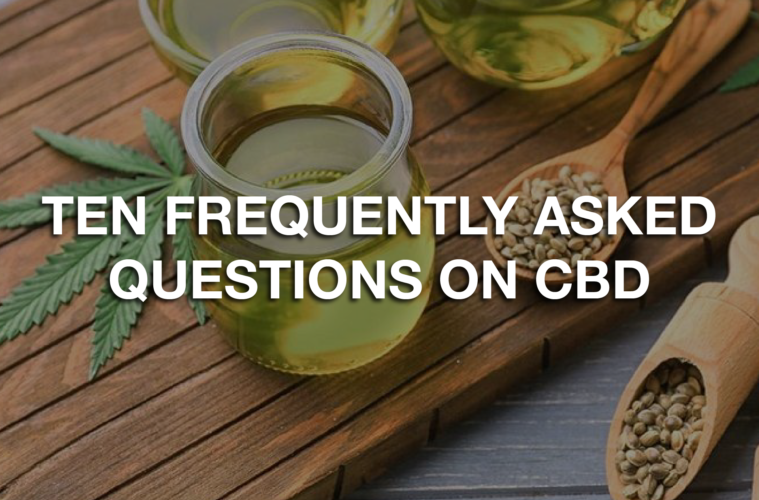This article was originally published on My CBD FAQ. To view the original article, click here.
Cannabidiol is turning increasingly mainstream, and with this comes doubts from customers. CBD has been around for a long time. However, the legalization of medical marijuana occurred only recently, so it is quite natural for customers to have doubts about this substance. Here is a compilation of top ten CBD FAQs.
How Does Marijuana And Industrial Hemp Differ From Each Other?
Both marijuana and hemp are derivatives of the same genus of plant, which is cannabis. However, these two plants differ genetically, in terms of cultivation, plus chemical process. Industrial hemp is grown to yield a wide variety of things, which include fabric, food, rope, and cannabidiol extracts. Marijuana is grown for high amounts of tetrahydrocannabinol. Industrial hemp contains trace amounts of tetrahydrocannabinol, and it does not have any mind-altering effects on the consumer. On the other hand, there can be over 20% THC in marijuana, which may make a psychoactive effect on the user. Read on for more CBD FAQs.
Is Cannabidiol Legal?
The US government created history by legalizing industrial hemp in 2018. It has been federally legal to sell and consume CBD provided that it only contains 0.3% THC. When hemp has only that much tetrahydrocannabinol, it is classified as hemp; otherwise, it is marijuana. Hemp is legal throughout the nation in one form or the other. Ask your local municipality officials for guidelines and laws regarding hemp because these can be complex.
Related: What are some of the uses of CBD? Click here to find out more.
What Is Cannabidiol?
Also known as CBD, cannabidiol is a chemical compound called ‘phyto-cannabinoid’ present in cannabis sativa. The plant has over 100 phyto-cannabinoids, and CBD is just one of these compounds. CBD can act on cannabinoid receptors present in the endocannabinoid system (ECS).
What Are The Properties of CBD?
The compound has many properties, including anti-seizure properties, antidepressant drug-like effects, anti-inflammatory, and antioxidant properties. Because it has these and more properties, CBD is effective for many different health conditions.
How Is Cannabidiol Oil Extracted?
Several ways to take out the valuable components of cannabis and hemp are available. It is possible to obtain the CBD content through solvents or the nonflammable and nontoxic CO2 Extraction method. This is considered the best method of CBD extraction because it consistently yields the best quality cannabidiol concentration. It is also among the safest CBD extraction methods, which does not leave any toxins behind.
Will I Experience A ‘High’ After Consuming CBD?
To cut the long story short, no. Whether a CBD product will have a psychotropic effect on you depends on how much of it you take. As mentioned above, CBD derived from industrial hemp has just small amounts of tetrahydrocannabinol. So the consumption of hemp CBD products should not make you intoxicated. However, CBD products containing more than legally allowed amounts of THC are available in the market.
Almost every CBD product is unregulated at a federal level, so it is tricky to know what it contains. If you consume an illegal CBD item, then you might get a psychoactive high from THC. On the off chance, you would get a high after consuming an excessive amount of legal CBD. Then again, note that either way, THC is what might cause the high, not CBD.
Related: Another common question surrounding CBD: Is CBD safe for kids? Click here to learn more.
Will CBD Show Up On My Drug Test?
Usually, it should not appear in your drug test result. However, because the FDA does not regulate CBD for purity and safety, your body might have enough CBD containing THC for it to appear in the result. This also depends on other factors, including the cut-off level for your test.
If you will undergo the test as part of recruitment, ask your doctor to know what the best thing to do in this situation is.
Does Cannabidiol Have Any Side Effect?
Yes, CBD has side effects, but these are negligible. Some of the reported undesirable effects are dry mouth and light headedness. Dizziness and cottonmouth occur only in some users and these side effects last only for a short period, and there are ways to manage these. For one, drinking much fluid before, in the course of and after CBD oil consumption will help to manage dry mouth.
What Are The Different Types Of CBD?
CBD can be categorized into three forms: ‘Isolate’, ‘Full-Spectrum’ and ‘Broad-Spectrum’. CBD isolate contains 99% pure cannabidiol, and it does not have any THC content. There is no THC in broad-spectrum CBD, but it contains CBD and other cannabis sativa compounds. On the other hand, full-spectrum CBD contains the legally-permitted amount of THC, besides those other substances. As per some experts, the best CBD product may be of ‘full-spectrum’ type, because it contains more of the beneficial substances extracted from hemp.
How Can I Consume CBD?
There are a few different ways to use CBD, including sublingual, inhalation, oral ingestion, and topical application. Sublingual use involves dropping CBD tincture under the tongue. Inhalation is self-explanatory, but if you are still confused, here is what it means: smoking or vaping CBD. Oral ingestion means putting CBD in the mouth and swallowing it. When you use cannabidiol topically, you apply a CBD product on the skin.
Advertising disclosure: We may receive compensation for some of the links in our stories. Thank you for supporting Irvine Weekly and our advertisers.


